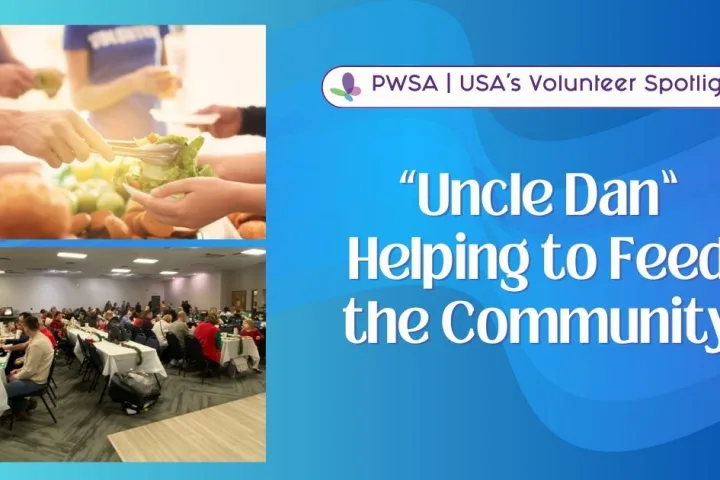While some organizations have scrambled to figure out how to continue their daily operations during the coronavirus pandemic, PWSA Chapters across the country are leading the way with unique virtual event experiences. Here are some original ideas that PWSA Chapters have been doing to keep the PWS community connected virtually:
- The Prader-Willi Syndrome Association of Ohio has been hosting a series of webinars covering a variety of social services questions – including adult Individual Support Plans, adult housing options, waivers, guardianship, and eligibility for DD services.
- Prader-Willi California Foundation (PWCF) and Texas Prader-Willi Association (TXPWA) hosted a series of virtual chat groups for families in California and Texas. These online support groups have been a great way to encourage families of individuals with PWS to connect with and learn from other families.
- The Minnesota Prader-Willi Syndrome Association was able to make a successful transition from their annual in-person golf tournament to a virtual fundraiser on short notice when the coronavirus pandemic hit earlier this spring. They are still hoping to be able to host an upcoming family farm picnic this fall.
- The Prader-Willi Syndrome Association of New England, in partnership with Latham Centers, has been hosting virtual social hours for young adults with PWS. Students with PWS (under 22 years old) have been able to connect and have fun together, meeting new friends and playing games.
PWSA Chapters around the country have strong leaders, are well organized, and have continued to offer stellar programs and services despite the coronavirus pandemic bringing many organizations to a halt.
As such, the PWSA | USA Chapter Relations Committee is excited to recognize Chapter leaders for their dedication to enhancing the quality of life of and empowering those affected by Prader-Willi syndrome (PWS) with an Outstanding Chapter Award ceremony. The Outstanding Chapter Awards will recognize the important role of Chapters and honor Chapters whose service positively impacts the PWS community in their state or region.
For more information about the Outstanding Chapter Awards, please contact Andrea Lucy at alucy@pwsausa.org





 Perry A. Zirkel has written more than 1,500 publications on various aspects of school law, with an emphasis on legal issues in special education. He writes a regular column for NAESP’s Principal magazine and NASP’s Communiqué newsletter, and he did so previously for Phi Delta Kappan and Teaching Exceptional Children.
Perry A. Zirkel has written more than 1,500 publications on various aspects of school law, with an emphasis on legal issues in special education. He writes a regular column for NAESP’s Principal magazine and NASP’s Communiqué newsletter, and he did so previously for Phi Delta Kappan and Teaching Exceptional Children. Jennifer Bolander has been serving as a Special Education Specialist for PWSA (USA) since October of 2015. She is a graduate of John Carroll University and lives in Ohio with her husband Brad and daughters Kate (17), and Sophia (13) who was born with PWS.
Jennifer Bolander has been serving as a Special Education Specialist for PWSA (USA) since October of 2015. She is a graduate of John Carroll University and lives in Ohio with her husband Brad and daughters Kate (17), and Sophia (13) who was born with PWS. Dr. Amy McTighe is the PWS Program Manager and Inpatient Teacher at the Center for Prader-Willi Syndrome at the Children’s Institute of Pittsburgh. She graduated from Duquesne University receiving her Bachelor’s and Master’s degree in Education with a focus on elementary education, special education, and language arts.
Dr. Amy McTighe is the PWS Program Manager and Inpatient Teacher at the Center for Prader-Willi Syndrome at the Children’s Institute of Pittsburgh. She graduated from Duquesne University receiving her Bachelor’s and Master’s degree in Education with a focus on elementary education, special education, and language arts. Evan has worked with the Prader-Willi Syndrome Association (USA) since 2007 primarily as a Crisis Intervention and Family Support Counselor. Evans works with parents and schools to foster strong collaborative relationships and appropriate educational environments for students with PWS.
Evan has worked with the Prader-Willi Syndrome Association (USA) since 2007 primarily as a Crisis Intervention and Family Support Counselor. Evans works with parents and schools to foster strong collaborative relationships and appropriate educational environments for students with PWS. Staci Zimmerman works for Prader-Willi Syndrome Association of Colorado as an Individualized Education Program (IEP) consultant. Staci collaborates with the PWS multi-disciplinary clinic at the Children’s Hospital in Denver supporting families and school districts around the United States with their child’s Individual Educational Plan.
Staci Zimmerman works for Prader-Willi Syndrome Association of Colorado as an Individualized Education Program (IEP) consultant. Staci collaborates with the PWS multi-disciplinary clinic at the Children’s Hospital in Denver supporting families and school districts around the United States with their child’s Individual Educational Plan. Founded in 2001, SDLC is a non-profit legal services organization dedicated to protecting and advancing the legal rights of people with disabilities throughout the South. It partners with the Southern Poverty Law Center, Protection and Advocacy (P&A) programs, Legal Services Corporations (LSC) and disability organizations on major, systemic disability rights issues involving the Individuals with Disabilities Education Act (IDEA), Americans with Disabilities Act (ADA), and the federal Medicaid Act. Recently in November 2014, Jim retired.
Founded in 2001, SDLC is a non-profit legal services organization dedicated to protecting and advancing the legal rights of people with disabilities throughout the South. It partners with the Southern Poverty Law Center, Protection and Advocacy (P&A) programs, Legal Services Corporations (LSC) and disability organizations on major, systemic disability rights issues involving the Individuals with Disabilities Education Act (IDEA), Americans with Disabilities Act (ADA), and the federal Medicaid Act. Recently in November 2014, Jim retired.